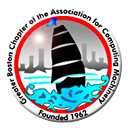The Physics of RFID
Radio Frequency Identification (RFID) systems have been around for over 50 years, starting with the pioneering radar transponder work of the MIT Radiation Laboratory. Today, the acronym RFID typically refers to single chip, passive transponders operating at 125KHz, 13.56MHz, or UHF (915MHz) that are widely used for access control, electronic toll collection, automotive anti-theft, and other closed system applications. Recent interest has focused on supply chain management applications for RFID, where RFID tags are used to augment the bar code to provide a case- and item-level view into complex supply chains. This revolution is being aggressively driven by retailers such as Wal-Mart, consumer packaged goods manufacturers like Gillette, and the Department of Defense, all of which have complex supply chain systems that could be made more efficient by using RFID. This talk will provide a brief historical overview of the field, show some examples of the current state of the art in RFID, and then explain the basic physical principles of operation of a UHF RFID tag, using a working RFID system to show these concepts. Questions about RFID privacy will also be addressed.
Matt Reynolds is a technical leader in the field of RFID through his work with the MIT Auto-ID Center and the Hardware Action Group of EPC Global, an organization which promotes electronic product codes. He is currently co-chair of EPC Global's Class 0 Working Group. Matt was involved in the design of the UHF Class 1 and HF Class 1 protocols from their inception, and is the lead designer of the Auto ID Center's multi-frequency, multi-protocol Reference Reader. At ThingMagic, Matt has been responsible for the design of RFID readers at low frequency, UHF, and microwave frequencies. Matt holds S.B., M.Eng., and Ph.D. degrees from MIT, where he was a Motorola Fellow at the MIT Media Lab. He has research interests in RFID, low power wireless systems, embedded communications and networking, radiolocation systems, electronic circuits and devices, and digital signal processing. Matt is a member of the IEEE and the Institute of Navigation.
